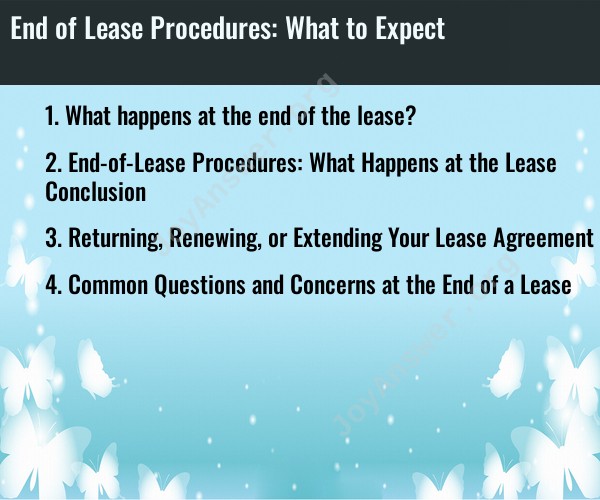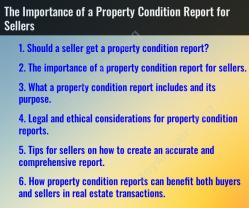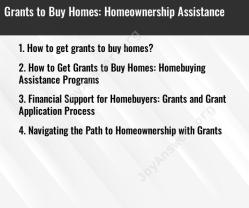What happens at the end of the lease?
At the end of a lease, whether it's a vehicle lease, residential lease, or a commercial lease, there are several common procedures and expectations that you should be aware of. The specifics can vary depending on the type of lease and the terms outlined in your lease agreement. Here's what you can generally expect at the end of a lease:
Lease Expiration: The lease agreement will specify the lease term and the exact date when it ends. At the end of this term, the lease is considered expired.
Notice to Vacate: If you're leasing a residential property, you'll typically need to provide notice to your landlord or property management company if you plan to move out at the end of the lease term. The notice period may be specified in the lease agreement.
Inspection: In the case of residential or commercial leases, the landlord or their representative may conduct an inspection of the property before you move out. This inspection is to assess the condition of the property and identify any damage beyond normal wear and tear.
Repairs and Cleaning: If the property requires repairs or cleaning beyond what is considered normal wear and tear, you may be responsible for these costs. It's a good idea to address any necessary maintenance or repairs before the end of the lease to avoid additional charges.
Security Deposit: Landlords often hold a security deposit, which is meant to cover any unpaid rent, damage, or cleaning costs. If there are no lease violations or outstanding bills, the landlord should return your security deposit, typically within a specified time frame outlined in your lease agreement.
Lease Renewal or Termination: Depending on your lease agreement, you may have the option to renew the lease for another term. If you do not wish to renew, you should follow the procedures for lease termination as outlined in your agreement.
Vehicle Lease Return: If you have a vehicle lease, you'll need to return the vehicle to the leasing company or dealership. They will conduct an inspection to assess any excess wear and tear or mileage charges, which may be incurred if you exceeded the mileage limit.
Lease Buyout: Some leases, particularly vehicle leases, offer the option to purchase the leased asset at the end of the lease term. If you're interested in buying the vehicle or property, you can explore this option.
Notification of Intent: It's essential to communicate your intentions regarding lease renewal, termination, or any other relevant decisions to the other party in advance of the lease's expiration.
Documentation: Ensure that you keep copies of all lease-related documents, correspondence, and receipts for any payments, repairs, or cleaning services. This documentation can be helpful if there are any disputes or questions about the lease termination.
It's important to carefully review your lease agreement, as specific procedures and requirements may differ depending on the terms set forth in the contract. Being prepared and proactive in adhering to the lease agreement can help ensure a smooth and hassle-free end to your lease.
End-of-Lease Procedures: What Happens at the Lease Conclusion
When your lease is coming to an end, there are a few things you need to do to wrap up your lease agreement and return your vehicle to the lessor. Here is a general overview of the end-of-lease process:
- Schedule a lease-end inspection: This inspection will be conducted by a representative of the lessor to assess the condition of the vehicle and identify any excessive wear and tear.
- Pay any outstanding lease payments and fees: This may include things like a disposition fee, excess mileage charges, and wear-and-tear charges.
- Return the vehicle to the lessor: Be sure to remove all of your personal belongings from the vehicle and bring your lease agreement and any other required paperwork.
Returning, Renewing, or Extending Your Lease Agreement
At the end of your lease, you have three options:
- Return the vehicle: This is the most common option. If you choose to return the vehicle, you will need to follow the end-of-lease procedures outlined above.
- Renew your lease: If you are happy with your vehicle and lease terms, you may be able to renew your lease. This will typically involve signing a new lease agreement and paying a new down payment.
- Extend your lease: If you are not ready to return the vehicle, but you are not ready to commit to a new lease, you may be able to extend your lease. This will typically involve paying an additional monthly lease payment.
Common Questions and Concerns at the End of a Lease
Here are some common questions and concerns that people have at the end of a lease:
- What happens if I return the vehicle with excessive wear and tear? You may be charged for any excessive wear and tear beyond normal use. The amount of these charges will vary depending on the lessor and the condition of the vehicle.
- What happens if I have excess mileage? You may be charged for excess mileage beyond your lease allowance. The amount of these charges will vary depending on the lessor and your lease agreement.
- Can I negotiate my lease-end charges? In some cases, you may be able to negotiate your lease-end charges with the lessor. It is always worth asking.
- What if I can't afford to make my lease-end payments? If you are unable to make your lease-end payments, you should contact the lessor immediately to discuss your options. You may be able to work out a payment plan or make other arrangements.
If you have any questions or concerns about the end-of-lease process, be sure to contact your lessor. They will be able to provide you with specific information about your lease agreement and your options.













